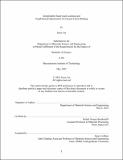Interpretable Supervised Learning and Graph-Based Optimization for Glycan-Lectin Binding
Author(s)
An, Joyce
DownloadThesis PDF (4.083Mb)
Advisor
Gomez-Bombarelli, Rafael
Terms of use
Metadata
Show full item recordAbstract
Non-linear biological macromolecules, such as glycans, participate in a wide range of key structural, metabolic, and regulatory functions in all living organisms. Many of these essential roles involve interactions with glycan-binding proteins called lectins. As a result, there is particular interest in the design of highly specific glycan binders to critical lectins such as dendritic cell-specific ICAM-grabbing non-integrin (DC-SIGN). However, insufficient knowledge of the binding specificity of lectins, combined with the enormous structural complexity of glycans that range from linear to highly branched, serve as a barrier to the rational computational and experimental design of effective glycan binders. Here, using mammalian microarray data from the Consortium of Functional Glycomics, we predict glycan-lectin binding affinity and lectin specificity using an interpretable graph-based supervised learning framework. For the first time, we uncovered both monomers and motifs more precise than the monomer unit critical for lectin specificity. Furthermore, we developed a general graph-based optimization framework for macromolecules that employs the trained regression model ensembles to design glycans with high binding strength, low uncertainty in binding strength prediction, and low probability of human immunogenicity. Our work provides a general framework for iterative, chemistry-informed and topology-agnostic design in the macromolecular chemical space.
Date issued
2022-05Department
Massachusetts Institute of Technology. Department of Materials Science and EngineeringPublisher
Massachusetts Institute of Technology